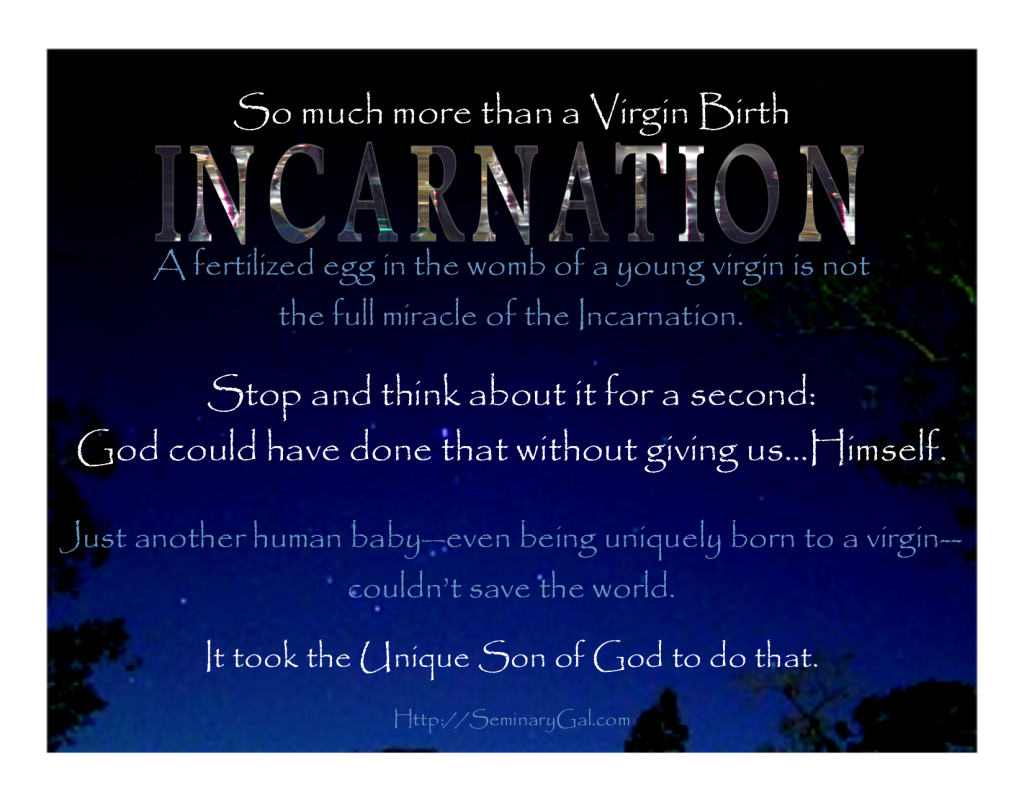Advent 11 (2013): Much More than Just a Virgin Birth
The Word became flesh and made his dwelling among us. We have seen his glory, the glory of the One and Only, who came from the Father, full of grace and truth. (John 1:14)
This week, we’re looking at the powerful verse 14 of the Prologue in the Gospel of John as we see Emmanuel: When LOVE Showed Up In-Person. Today, we’ve reached one of the most interesting phrases in all the New Testament: the glory of the One and Only.
Not that you particularly care about the original Greek words of the New Testament, but there are instances in which English does not do a concept justice.
The specific word in question is monogenēs and is a word used of other people, too, not just Jesus Christ.
- The only son of the widow of Nain (Luke 7:12)
- The only daughter of Jairus (Luke 8:42)
- The only son—demon possessed—whose desperate condition prompted the boy’s father to seek Jesus for healing (Luke 9:38)
- The child of promise (Isaac) whom Abraham was asked to sacrifice to the LORD on Mount Moriah
I bring this up because the Latin Vulgate translation of the Bible (the definitive translation for over 1000 years of Christendom still holding a special place for Roman Catholics) as well as the King James and New King James versions all render monogenēs as the “Only Begotten.”
Just a nuance or something more?
I’d argue that it moves the focus from the unique, powerful, divine, and poignant LOVE relationship of Father and Son, evoking a strong sentiment of what a sacrifice this was of God the Father to pursue His Incarnation…and changes it to an emphasis on the Virgin Birth. This rendering, in other words, takes what is truly divine and brings it down to a human level. It sees the Incarnation more from Mary’s and our human point of view and less from God’s.
That monogenēs is used of other people’s children, too, reminds us that in the Incarnation, the simple act of being born human–as Only Begotten–is not completely what it’s all about. (This human error leads to the idea–common among Mormons, for example—that we can all be elevated to godhood someday basis our good lives. It’s an error of biblical proportions.)
It’s not simply about the humanity of Jesus Christ as God’s “only begotten” Son.
It’s an important distinction that His eternal divinity’s being made flesh is what makes the Incarnation the Incarnation. We see the glory of the One and Only God. We see Jesus and we see the Father.
It’s about the unique divine relationship of LOVE existing from before time, sacrificially set on partial-hold, as Jesus added our humanity to His eternal divinity in order that—by His unique, holy, and divine relationship to the Father—He might save us. Monogenēs points out that this sacrifice is even more powerful because of the divinity of the unique (One and Only) Eternal Word sent in the flesh to save us. It was a huge sacrifice on the part of God to condescend to save us and powerful evidence of the divine eternal LOVE that showed up at Advent in the Person of Jesus Christ.
A fertilized egg in the womb of a young virgin is not the full miracle of the Incarnation.
Stop and think about it for a second: God could have done that without giving us Himself.
Just another human baby—even being uniquely born to a virgin–couldn’t save the world.
The true miracle of the Incarnation is the eternal divine Word became flesh as God’s most poignant display of the greatness of His LOVE by sending Jesus—a wholly and holy unique Son—to come, to be born, to live, to teach, and to die that we might be able to be saved by believing in Him.
So much more than just a Virgin Birth, is it not?



Leave a Reply